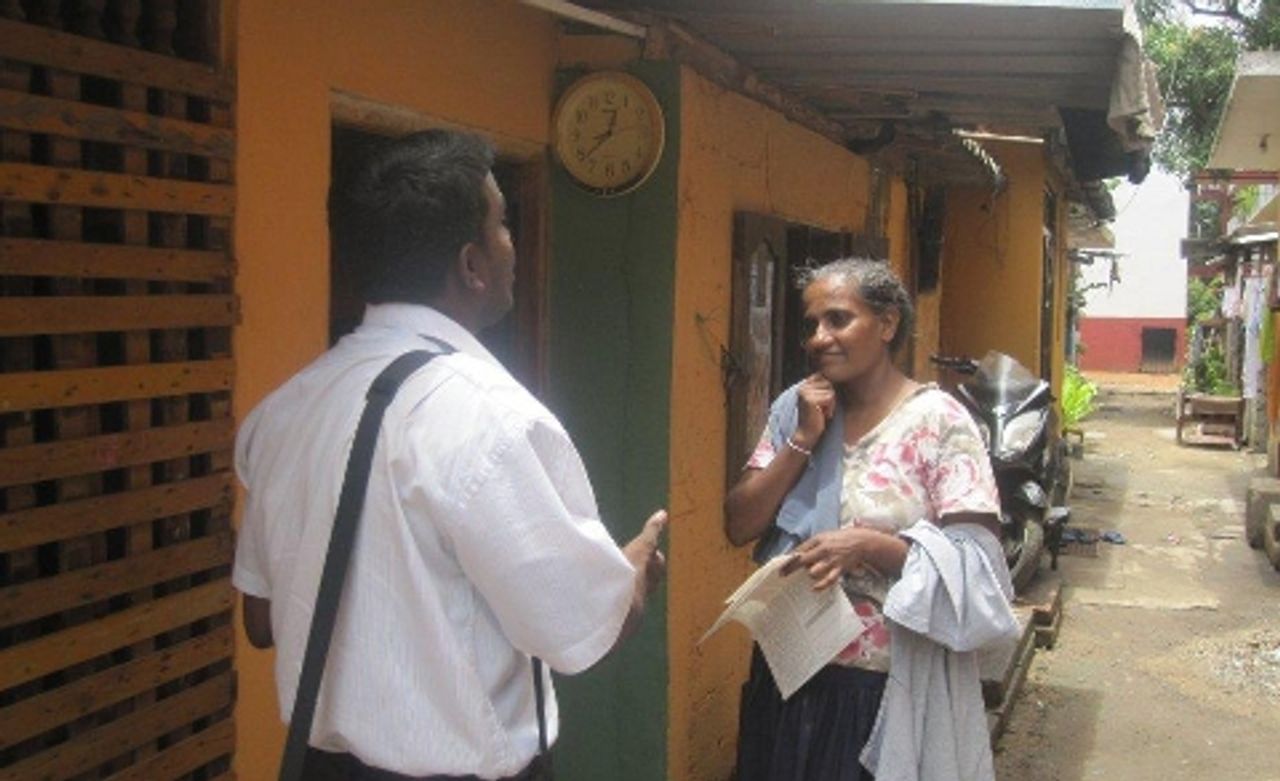Socialist Equality Party (SEP) teams are campaigning intensively for US presidential candidate Jerry White’s visit to Sri Lanka this week. White, a longstanding and leading member of the US SEP, will address a public meeting at the New Town Hall in Colombo on Sunday. Other meetings will follow at Kegalla and in the southern provincial city of Galle on August 28 and 30 respectively.
Over the past two days, SEP supporters have distributed thousands of Sinhala- and Tamil-language leaflets advertising White’s tour in Colombo’s Maligawatta, Slave Island and Maradana districts, and at the Fort Railway Station, the city’s principal transport hub.
Apart from a few articles in the English-language press, there has been virtually no mention of the American presidential election by the Sri Lankan media. The local press, however, regularly features speeches by Sri Lankan President Mahinda Rajapakse, his ruling party leaders and Sinhala chauvinists posturing as anti-imperialists. This is aimed at covering up the government’s attempts to accommodate itself to the US and other major powers.
 H. Tuan
H. TuanH. Tuan, a young hotel worker, was enthusiastic about the Jerry White’s international campaign. He told SEP supporters that he was aware of the US involvement in the overthrow of Muammar Gaddafi in Libya and commented on the increasing social polarisation in the US. “The rich are getting richer and the poor, poorer in every country,” he said.
Maligawatta and Slave Island residents are angered by government’s plans to evict about 70,000 poor families from these inner-city districts and open up the area to land speculators and investors.
A Maligawatta housewife praised the SEP’s principled opposition to the evictions and said: “Only your party has explained to us what is exactly taking place.” She hoped that US pressure on the Rajapakse administration over human rights issues would “control the government to some extent.”
SEP campaigners explained that the Washington had backed the Sri Lankan government’s war against the separatist Liberation Tigers of Tamil Eelam (LTTE) and had not called for the release of the thousands of young Tamils still incarcerated in detention camps and prisons. US human rights concerns, the SEP supporters said, were aimed at pressuring the Sri Lanka government to end the close relationship it had developed with China during the war.
After discussing the danger of war in the region and the political significance of White’s intervention among the international working class, the housewife said: “We don’t pay much attention to these international developments, but it’s good that you’ve explained this to us.” She purchased a copy of the WSWS Review to learn more.
A husband and wife from Maligawatta explained the local resistance to the government’s eviction plans. “We are all opposed to any evictions,” the husband said, and discussed pickets and other protests by the residents.
“I lost the fish stall that we inherited from my grandfather. The government shifted the main fish market out of Colombo and demanded a huge sum for the provision of a new stall. How can I pay that? We haven’t had any electricity for several months because I couldn’t pay the bill.”
The husband saw a parallel between their plight and the social crisis in America. “I will definitely attend your meeting,” he promised.
 SEP campaigner speaking with a Maligawatta resident
SEP campaigner speaking with a Maligawatta residentJanindu Nanayakkara, originally from Matara in Sri Lanka’s south and now studying in Colombo, told campaigners that the SEP’s decision to contest the US presidential elections was “important and relevant to us.”
“Sri Lanka is subordinated economically and politically to powerful countries. These governments can’t break from this,” he added. “I don’t like this system but those in the opposition are even more obedient to these powers. If you can’t win this election, will you be able to win the next one?” he asked. SEP supporters explained that the elections were designed to maintain the capitalist state. For real social change, they said, a socialist revolution was necessary.
Janindu asked about the revolutionary upsurge in Egypt and noted that the movement had been diverted, allowing the US to “take the advantage” of the situation. “We don’t want that to happen here,” he said. SEP supporters explained the role of played by pseudo-left groups such as the Revolutionary Socialists in Egypt, which backed the right-wing Muslim Brotherhood and betrayed the upsurge.
A Zahira College student living in Slave Island said he was “surprised” to hear that an American presidential candidate was visiting Sri Lanka. “I agree with you that this [US] election is relevant to every country. And it’s clear, as you said, that both the leading candidates [Obama and Romney] are incapable of resolving people’s issues. As Muslims, we thought Obama would stop wars in Afghanistan and Iraq but that was only a dream. America is waging wars to loot oil from the Middle East and control energy reserves around the world.”
After SEP supporters explained that only an internationally organised movement of the working class could stop war, the student commented: “We should support Jerry White’s visit to Sri Lanka for that reason. I previously thought that America was only waging war against Muslim countries. Now I know that is not the case. During the war in Sri Lanka, America supported Sri Lanka financially and militarily and also provided training. After that, it started talking about human rights issues. I didn’t understand this two-track policy very well.”
The student said he wanted to understand how Washington’s criticisms of the Rajapakse government were bound up with US geo-strategic interests in South Asia and its attempts to counteract Chinese influence in the region. He carefully listened to the SEP’s analysis and said: “I didn’t know about the relation between China and South Asia before this conversation, but it now makes sense.”
A young tea factory worker said he was worried about the fall in tea prices during the recent period and said the core reason was the global financial crisis.
“I previously believed that America still had very good living conditions for ordinary people. But it seems that Americans face a bad situation like us here in Sri Lanka today. I think [Jerry White’s meeting] will help us to find a solution.”
